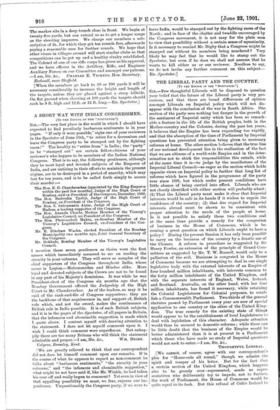A SHORT WAY WITH INDIAN CONGRESSMEN.
[TO THE EDITOR OP THE "SPECTATOR."]
Sit,—The very last place in the world in which I should have expected to find peculiarly barbarous sentiments is in your pages. "If only it were possible," sighs one of your reviewers in the Spectator of June 15th, "to retire for a decennium and leave the Congress party to be stamped out by the fighting races !" The locality to "retire from" is India; the "party" to be "stamped out" are certain fellow-citizens of your reviewer's who happen to be members of the Indian National Congress. That is to say, the following gentlemen, although they be most loyal and devoted subjects of the Emperor of India, and are untiring in their efforts to maintain the present regime, are to be destroyed in a period of anarchy, which may last for ten years, and is to be called forth simply to secure their murder :— The Hon. N. G. Chandavarkar (appointed by the King-Emperor within the past few months), Judge of the High Court of Bombay, and ex-President of the Congress, December, 1900.
The Hon. Budrudin Tyabji, Judge of the High Court of Bombay, ex-President of the Congress. The Hon. S. Subramania Aiyar, Judge of the High Court of Madras, a leading supporter of the Congress.
The Hon. Ananda Charlu, Madras Member of the Viceroy's Legislative Council, ex-President of the Congress. The Hon. Pherozeshah Mahta, ex-Bombay Member of the Viceroy's Legislative Council, ex-President of the Con- gress. Mr. E. Dinshaw Wachs, elected President of the Bombay Municipality two months ago, Joint General Secretary of the Congress.
Mr. Gokhale, Bombay Member of the Viceroy's Legislative Council.
I mention these seven gentlemen as theirs were the first names which immediately occurred to me on reading the atrocity in your columns. They will serve as samples of the chief supporters of the Congress throughout India, whose name is Legion,—Mahommedan and Hindoo alike. More loyal and devoted subjects of the Crown are not to be found in any part of his Majesty's dominions. It was while he was President-elect of the Congress six months ago that the Bombay Government offered the Judgeship of the High Court to Mr. Chandavarkar. As of the leaders, so may it be said of the rank-and-file of Congress supporters : they are the backbone of that acquiescence in, and support of, British rule which, and not the sword, makes the continuance of British rule in India possible. It is of such British subjects, and it is in the pages of the Spectator, of -all papers in Britain, that the infamous and abominable suggestion is made which I quote above. I content myself with drawing attention to the statement. I dare not let myself comment upon it. I wish I could think comment were superfluous. But unhap- pily there are too many Britons who will think the statement
[We are greatly relieved to think that our correspondent did not dare let himself comment upon our remarks. If in the course of what he appears to regard as non-comment he talks about "barbarous sentiments," "the atrocity in your columns," and "the infamous and abominable suggestion," what might he not have said if, like Mr. Winkle, he had taken his coat off and really begun to comment? Yet even in view of that appalling possibility we must, we fear, express our im- penitence. Unquestionably the Congress party, if we were to
leave India, would be stamped out by the fighting races of the North ; and in face of the chatter and twaddle encouraged by the Congress movement, it is not easy for the plain man to view that possibility without a certain sense of equanimity. Is it necessary to remind Mr. Digby that a Congress might be stamped out without its members being murdered ? Very likely he may feel that he would like to stamp out the Spectator, but even if he does we shall not assume that he wants to kill either us or our reviewer. Needless to say, we do not invite any further comment on this subject.— ED. Spectator.]










































 Previous page
Previous page